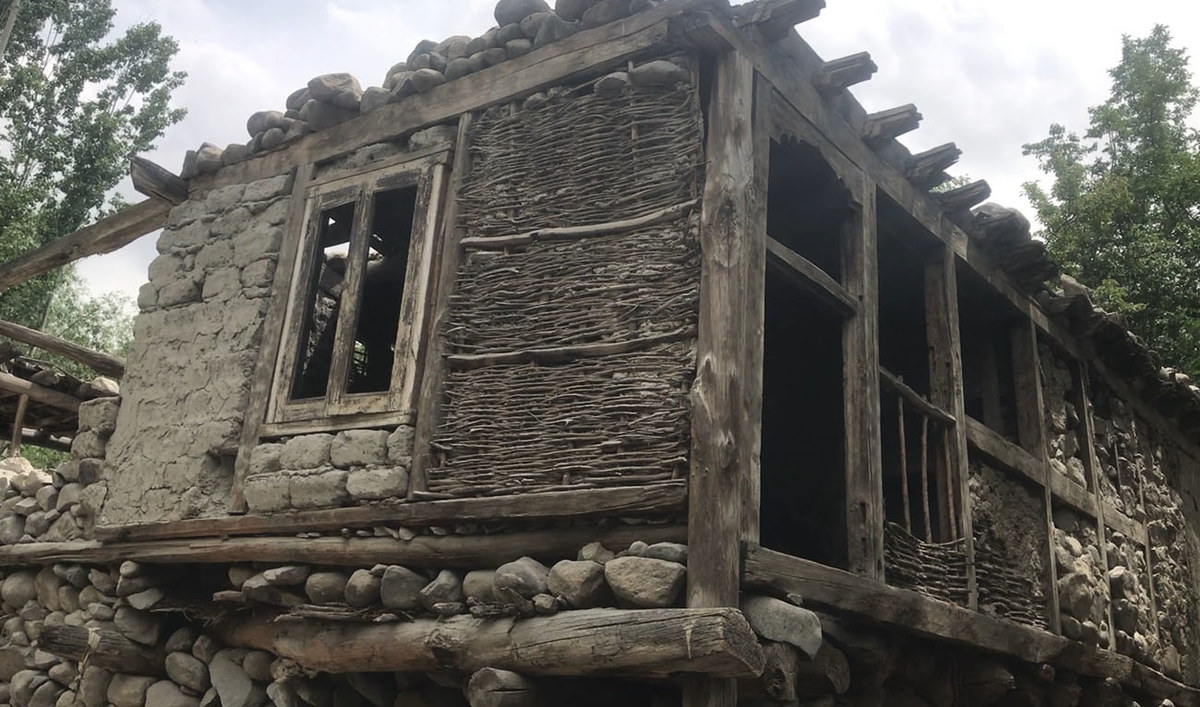KHAPLU, Gilgit-Baltistan: In northern Pakistan, ancient homes that have withstood earthquakes, inclement weather and the ravages of time may not be able to withstand the appeal of modern architecture.
Centuries-old houses known as Shaq Khang, woven with the twigs of poplar and willow trees, are increasingly giving way to modern construction and architectural styles in the picturesque Gilgit-Baltistan region, especially in Bara Valley, where the unique houses are most prevalent.
“Shaq is a name derived from the twigs of poplars and willows in the local Balti language,” Muhammad Ali, a 65-year-old resident of Bara Valley, said. “Shaq is made, knitted from [twigs of] poplar and willows trees. Beams, pillars, and walls are also made from the same trees.”

The still image taken from a video recorded on May 23, 2023 shows a Shaq Khang, a centuries-old architectural style house in Gilgit-Baltistan region of Pakistan. (AN Photo)
The natural construction materials, Ali said, offered more insulation, keeping the interiors of homes warm during winter and cool during summer.
Ali is from the village of Tatos, which roughly translates to ‘now see’. Due to its height, it offers a panoramic view of Khaplu, the administrative capital of Ghanche District.
“Everyone comes here to see [the view]. But due to the dilapidated condition of the road, only a few tourists visit here,” Ali said.
Many tourists come to see the ancient homes, he said, “made before the partition of the subcontinent.”
Ghulam Muhammad, a 75-year-old resident of the town, concurred that many of the area’s Shaq Khang homes had lasted several generations.
Two historians Arab News spoke to said there was no recorded history of how old the technique of making Shaq Khang was.
“Shaq never falls apart,” Muhammad said. “The life of cement is 100 years after which it deteriorates. Metals catch rust and break. But wood never gets spoiled even after 500 years. This is the beauty of Shaq.”
Muhammad added that the traditional houses were “quake-resistant,” which was important in the seismically active region.
Dr. Muhammad Arif, a historian and former director-general at the Department of Archaeology and Museums in Islamabad, emphasized the significance of Shaq for GB’s ancient culture. The houses were low-cost and easy to build also, he added, requiring minimal upkee, and suited to the mountainous environment and extreme weather conditions.
“The twigs of poplars and willows are intricately woven together to form the walls of Shaq, creating a strong and interconnected structure,” he told Arab News. “To enhance its strength, we apply a plaster of mud mixed with various substances. For example, we add husk to make the mud more compact, and we even incorporate apricot juice to strengthen it like cement.”
“[They are] earthquake-resistant and very flexible. That’s why, whenever an earthquake comes, the whole unit will shake [but] not fall,” Arif added. “If the home is made of stone and other things, there is a chance of falling.”
But with increasing wealth, people were opting for cement houses as a “fashion statement,” Arif lamented, though the modern structures lacked weather-friendliness and failed to protect the inhabitants from extreme temperatures.
The decline in the number of traditional houses had also raised concerns about the loss of the region’s cultural heritage.
“This architecture is our asset, these Shaq Khang homes are our recognition,” Arif said. “And it is a fact that this architecture is disappearing from the region as people are making modern houses.”
“This is an important part of our culture and to revive these houses is the need of the time. Tourists can also be attracted to this region through these ancient buildings. If we don’t play our role to revive these, our history will also be disappeared.”
Wazir Ejaz, CEO of the Baltistan Cultural Development Foundation (BCDF), told Arab News the group was trying to conserve the homes.
“We have trained many locals in Skardu and Ghanche districts of Ghanche to make Shaqs,” he said. “And [with the help] of Baltistan University, we will train more locals to build them.”















